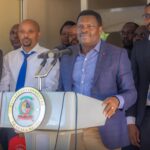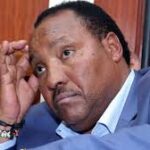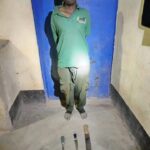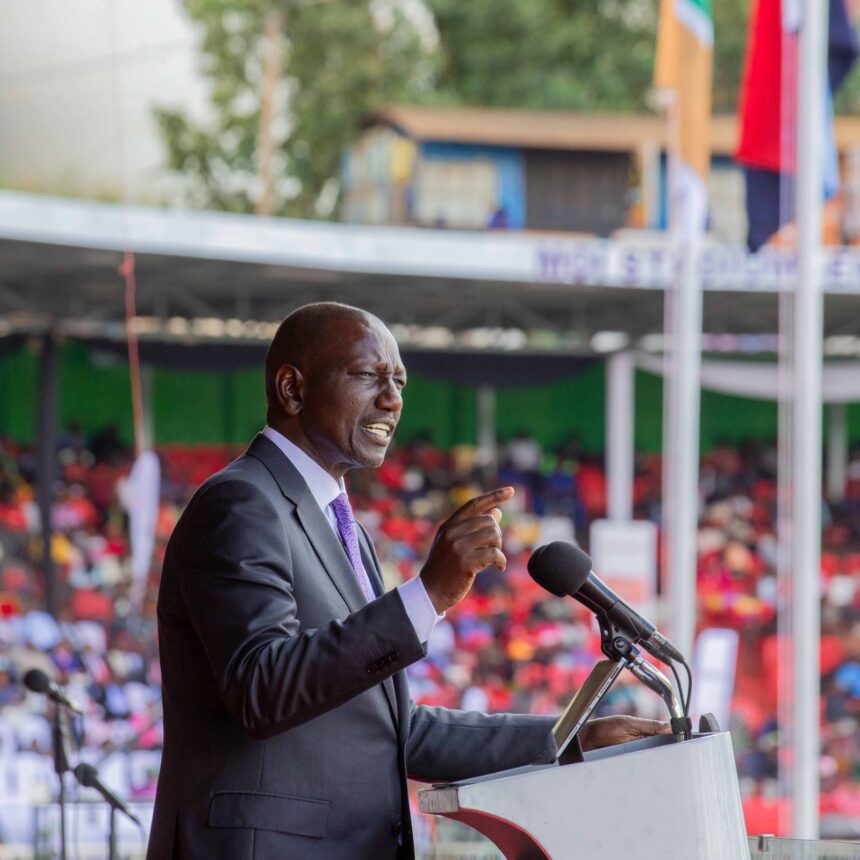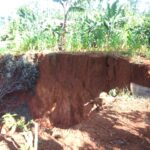REMARKS BY HIS EXCELLENCY WILLIAM SAMOEI RUTO, C.G.H., PRESIDENT OF THE REPUBLIC OF KENYA AND COMMANDER-IN-CHIEF OF THE DEFENCE FORCES DURING THE 60TH MADARAKA DAY CELEBRATIONS JUNE 1ST, 2023
- H.E. Azali Assoumani, President of the Union of Comoros, and Chairperson of the AU Assembly of Heads of State and Government,
- H.E. Issoufou Mahamadou, Former President of the Republic of Niger,
- Diplomatic Corps, Distinguished Guests, Kenyans,
- Kenya @ 60: A Celebration of Freedom and Enterprise
- On this day, 60 years ago, Kenya formally gained its right of internal self-government. Madaraka, the mandate of majority African self-determination, was a major step towards the emergence of this nation as a Republic later that year. That first Madaraka Day, then, was the golden dawn of our country’s sovereignty: Freedom from colonial oppression, autonomy from racist repression and liberty from foreign suppression.
- In fighting for our sovereignty, our noble freedom fighters had primarily waged a political struggle to liberate a people violated, humiliated and impoverished under a predatory system whose institutions were vicious and extractive. So, although the freedom struggle was political and the first Madaraka Day represented political autonomy, every Kenya African understood it to be the beginning of the hard and noble work of securing and enhancing social and economic freedom as well.
- For six decades now, the people of Kenya have worked hard, with admirable diligence and unwavering determination, to perfect the political freedom of their nation through sustained socioeconomic progress. In this manner, Kenyans have reiterated their commitment to true freedom by complementing political freedom with freedom from want, freedom from suffering, freedom from ignorance and freedom from indignity.
- Our forefathers’ heroic struggle to vindicate our God-given right of self-determination entailed tremendous sacrifice and immense determination against a colossal adversary. Ultimately, they triumphed. Similarly, our war against underdevelopment, poverty, indignity and vulnerability has been daunting. Yet we have made steady progress year after year, over 60 years of freedom.
- At the heart of our struggle for freedom, both before and after independence, is the distinctively Kenyan spirit of determination that is nevertheless flexible, consistency which is innovative, pragmatism that is also hopeful and faith strong enough to take chances. The sacrifices required were inspired by a spirit that is truly unique, which transcends ordinary decision making.
- We recognise that spirit even now. It lives in the heart of every Kenyan who wakes up every morning to give their best, try their luck, knock on doors and chase their dream. We see it every day when we meet traders, artisans, farmers and other workers braving the scorching sun and enduring cold rain in pursuit of livelihood. We also witness it in the teachers, nurses, police officers, extension officers and technicians who go far from their comfort zone, often beyond the call of duty, to attend to Kenyans in their communities throughout the country.
- This noble ethic, of willingness to struggle by working hard and embracing risk, and of determination to achieve positive change in great leaps as well as little instalments, has brought us far and will take us beyond the horizon of our destiny.
- Today, I join all Kenyans to celebrate our magnificent collective achievements, and the spirit of brave endeavour which inspired them 60 years ago and sustains us today. This celebration speaks to the sustained effort we have invested in perfecting our national mandate of selfgovernment. I will highlight the wonderful ways in which we have stewarded political freedom into democratic maturity, enhanced economic freedom by empowering enterprise and expanded social freedom by securing dignity.
A Maturing Democracy
- We must never forget that until fairly recently, our country’s politics was a divisive, violent, do-or-die affair by which neighbours, colleagues and even relatives were incited into hatred in the name of political competition. In this dark era, the tribe was the fundamental term of all political engagement and the master variable of democratic contest. Many highly respected experts and eminent persons confidently affirmed that Kenyan politics is inherently tribal, and many leaders designed their political parties, policies and campaigns on the basis of raw tribal appeals.
- Leaders also made sure that political discourse revolved around personalities and the private interests of a few privileged individuals, and not the aspirations of the majority. Some used political parties as personal vehicles to access the high table where important decisions were made, and exploited their ethnic constituencies to negotiate
a bigger share of public resources as well as positions of power and privilege in the service of private ends.
- For decades, Kenyans understood that this perverse political culture not only defiled our democracy, but also obstructed the spirit of daring and achievement, arresting our collective progress. The people of Kenya therefore yearned for freedom from the tyranny of political personality cults, toxic tribal discourse and the violence they engendered. They desired a more unifying, cosmopolitan framework of engagement which promoted the expression of their shared aspirations, encouraged inclusive negotiation and a collective means of pursuing them.
- In the last General Election, the people of Kenya finally broke free: The campaign was conducted purely on the basis of important national issues, foremost of which were economic issues. Not only did Kenyans reject the old divisive politics of tribe and tribal chiefs, but they also demanded and interrogated well-considered party manifestos with detailed plans for economic transformation. As a result, although the election was closely contested, it was the most peaceful in the multiparty era.
- Our public discourse and political discussion and the agenda of social debate has changed for good. Substantive policy issues continue to define the national conversation well beyond the election. At the moment, there is a robust debate on the Finance Bill taking place everywhere in this country: Church, social places, formal and informal workplaces, all media platforms and busy markets, as well as in urban and rural gatherings.
- We are truly a trailblazing nation. Many countries struggle in vain to generate a national debate on public financing, taxation or other policy issues. In Kenya, we have easily sustained intense discourse on the Finance Bill and the Affordable Housing Policy for several weeks now. The debate has remained issue-oriented, and there is no hint of divisive ethnic rhetoric at all. The cost of living is keeping all leaders, including myself, awake, and this is precisely as it should be.
- Superficially, the intense national debate on housing is not about whether it is a tax or a contribution. The attention sharply focused on the housing contributions is an implicit expression of ownership. People desire better information and stronger assurances regarding the custody, security, investment and return on their money.
- More encouragingly, the discourse on public finances and the Housing Fund has opened our eyes to our emergence as a Stakeholder Republic. Kenyans today, more than ever, are fully involved citizens in shaping public policies and making institutions accountable in the manner in which they run national affairs. This is the vision of Madaraka expressed in the first article of our Constitution: All sovereign power belongs to the people of Kenya.
- We have crossed a fundamentally decisive threshold in the history of our political freedom and democratic maturity. Today, Kenyans of this generation honour patriots who went before us in this celebration of a noble and historic achievement, our priceless legacy to future generations.
- Kenya also set a new high in election management by deploying a secure, freely accessible public portal which accurately and faithfully relayed vote tallies in the last election, enabling Kenyans and indeed anyone else to compare and verify tallies and ascertain results. This enabled the IEBC to credibly declare and certify the winners of elections, and to establish before court, in response to petitions by dissatisfied candidates, that the elections met the constitutional threshold as simple, accurate, verifiable, secure, accountable and transparent. In fact, the openness and credibility of the 2022 election are affirmed by the fewer petitions filed; 124 petitions compared to 303 in 2017.
- The economy was the most important issue on which the last election was canvassed. The people of Kenya, in their multitudes, made their voices heard, their ideas clear and their desires known. From Busia to Banissa, Lokichoggio to Lamu, Magadi to Moyale, Mandera to Migori, and everywhere in between, the people said they wanted to transform our economic system, democratise opportunity, enhance inclusion and reduce exploitation.
Enterprise: MSMEs, Cooperatives and the Hustler Fund
- Instead of the traditional campaigning of confrontation, incitement and division, the last campaign became a sustained national debate on the most pertinent economic issues: the millions of our unemployed youth, access to affordable credit, inclusive financing, promoting the robust expression of the legendary Kenyan ‘hustling’ spirit through MSMEs and the facilitation of individual enterprise by enhancing market power through collective interventions like the chama and sacco. This is how Kenyan entrepreneurs desired to secure access to credit, savings, markets, social security and health insurance.
- By paying attention to their aspirations, we established that Kenyan entrepreneurs desire to pursue success through enterprise, which takes positive measures to ensure that no one is left behind or exploited. It is an enterprise culture which encourages the pursuit of individual aspirations through collective systems, which empower every person to succeed within the context of a thriving community.
- In the course of consultations with Kenyans at the grassroots throughout the country, we identified a number of barriers to effective realisation of their economic agenda. The first was the bureaucracy in regulation and compliance, including tax administration.
- Second, the extreme informality of most enterprises, which effectively relegated them to the margins of empowerment, facilitation or even recognition as lawful undertakings. Third, was the misconception around “expanding the national tax base”: Is it about people paying more or more people paying? The answer lies in empowering more Kenyans to enter the taxable income category through intentional effort to create millions of new jobs.
- Fourth, a huge number of Kenyans, about 10 million, had either been blacklisted by the Credit Reference Bureau (CRB) over inability to pay loans advanced by financial technology platforms, or were struggling to pay. Other lenders required hefty securities and valuable assets as collateral, yet these struggling entrepreneurs required financing to acquire such assets in the first place. It was clear, therefore, that the prevailing financing and credit facilities were not supportive to the profitable existence of micro, small and medium-size enterprises.
- Self-employment accounts for 51.31 per cent of all jobs in our economy. 83 per cent or 15.3 million jobs are in the informal sector, and only 3.1 million jobs are in the formal sector, representing 17 per cent. Considering this employment landscape, it was imperative that we attend to the interests of this underserved majority of workers urgently, resolutely and effectively.
- This engagement with the business community inspired the creation of the Financial Inclusion Fund, or the Hustler Fund. To eliminate the financial cost, delay and bureaucracy entailed in complying, the facility employs the latest fintech, powered by Kenyan telecommunications corporations. The Hustler Fund also re-engineered the idea of collateral by deploying the borrower’s credit score as effective security.
- Without doubt, the Hustler Fund has been more than transformational; it is revolutionary.
- On its way to becoming effectively the biggest financial institution by the number of borrowers and active loans, the Hustler Fund also turned around the country’s fintech, transforming it from a predatory ecosystem to a more responsible one. As a result, Kenya’s digital economy has received a tremendous shot in the arm as demonstrated by reports that Safaricom alone has enrolled at least 2 million new subscribers into its financial ecosystem courtesy of the Fund.
- Today, as we celebrate progress in achieving economic freedom, we also celebrate our digital economy, powered by our famous fintech community. Kenya’s legendary spirit of enterprise has entered the digital space.
- Kenyans responded to this promise of economic freedom in unequivocal terms. The total number of digital transactions now stands at 42.5 million through which 20.2 million Kenyans have accessed nearly KSh30 billion, and repaid KSh19.7 billion, with 7 million being repeat customers. Not a single shilling has been stolen through corruption, and borrowers do not need to know anyone, bribe any official or go through complex bureaucratic procedures to access the Hustler Fund. They only need a device, a little airtime and a few minutes, and they are able to get money wherever they are.
- The second product of the Hustler Fund will usher our unique collective-driven competitive market enterprise to the online domain. To promote inclusion, the Hustler Fund is going to deploy groups such as chamas and saccos overcome exclusion and barriers to participation in credit, savings, social security, health insurance and other socioeconomic amenities. This is how we will use policy and technological innovation to mainstream our way of life. We are committed to leveraging fintech in ensuring that no one is left behind in the financial and entrepreneurial inclusivity revolution.
- I am delighted to announce that during today’s celebrations, I shall be launching the second product of the Financial Inclusion Fund, which is aimed at facilitating people access funding through groups. I am sure that this will be very good news to my good friend Shiko from Ruaka,
who, like many informal business entrepreneurs, was ready for this innovation even before we launched the first Hustler Fund product.
- I am glad that this launch of the group loan product is taking place against the backdrop of the phenomenal success of the Hustler Fund Personal Loan product. I expect that this product will encounter even greater appetite from the market.
- As I have already mentioned, your credit score will determine the amounts you can access, and the group is your collateral. This means that your conduct as an entrepreneur, and as a member of community will begin to define your creditworthiness. But there will also be opportunities to rehabilitate defaulters if they demonstrate sustained behaviour change.
- Thus, we have equalised the formal and the informal system, enabling both to enhance their complementary contributions to jobs and wealth creation from an equal footing. As we celebrate this increase in our economic freedom, today we also celebrate the democratisation of the Kenyan economy.
Housing
- This is why more Kenyans are taking part in robust conversations about our economy. The conversation is inclusive, focusing on the proposals to raise taxes to discourage imported goods that can be manufactured locally so as to grow local manufacturing and enhance export competitiveness. In this debate, Kenyans are interested in how government will create the 1 million jobs
it has committed to provide through the Affordable Housing Programme.
- During this discourse, an understanding is emerging that the construction of a housing unit consumes a tremendous amount of manufactured products. The Affordable Housing Programme is therefore an intervention supporting the local construction industry, including the Jua Kali sector, to create high quality and competitive opportunities for manufacturers and jobs for citizens. By catalysing the construction of hundreds of thousands of affordable housing units, we shall also be stimulating productivity and competitiveness in the manufacture of cement, steel, paint, nails, ballast, timber, roofing materials, windows and doors, among many other products.
- In enhancing Kenya’s industrial productivity, our export performance will increase and have a positive impact on our balance of trade, employment creation and the growth of wealth. Through regional and continental integration initiatives, a vast untapped African market exists to consume Kenyan industrial output.
- Our vision for the Affordable Housing Programme is premised firstly on the economic objective of creating a million direct and indirect employment opportunities throughout every value chain in the housing development ecosystem. A single housing unit is capable of employing 3-5 workers directly, and an additional 8 workers indirectly, in the manufacturing of construction products, transport and logistics.
- The second objective of the Affordable Housing Programme is to increase the number of homeowners and transition more Kenyans from rent-paying to homeownership.
- The Affordable Housing Programme aims to enable mama mboga access and afford a mortgage and embark on a feasible journey towards home ownership. Beyond the cost of houses, the programme therefore entails an entitlement aspect, which gives priority to the communities resident where the projects are situated. This way, the housing programme will raise the bar in terms of quality at the bottom.
- The third objective of the Affordable Housing Programme is human dignity, and entails the liberation of millions of people who live in unhygienic environments without proper sanitation. We did not fight for independence to relegate our innocent compatriots to a life of suffering, exclusion and indignity in slums.
- In brief, our nation is involved in collective public reasoning on the ways and means of baking a much larger cake for everyone, as opposed to unpleasant quarrels about who gets a share of a minute cake, and who does not.
- To enhance our national productivity, we are prioritizing the consolidation, processing and value addition of agricultural products. This is being achieved through the establishment of county aggregation and industrial parks in all the 47 counties. Additionally, the government has stepped up the establishment of five additional export zones in the coming financial year in Sagana, Thika, Njoro, Eldoret and Busia to complement the one in Athi River. Our special economic zones in Dongo Kundu, Naivasha and Isiolo will act as further catalysts in attracting domestic and international investments.
- At the same time, we remain firmly committed to continental free trade, and the effective implementation of the Africa Continental Free Trade Area. Just this week, we concluded the working retreat for trade ministers of the continental free trade area with the private sector. I am glad to welcome to this gathering the delegation that has been holding Africa Private Sector discussions in Nairobi led by my brother the President of Comoros, His Excellency Azali Assoumani, and one of the foremost champions of Africa Continental Free Trade Area.
- It is also gratifying to note that 11 Trade ministers are here today. I wish to recognise the following delegations led by the AfCFTA Secretariat:
I. Delegation from Comoros
II. Delegation from Niger
III. Delegation from Central Africa Republic iv. Delegation from Chad
IV. Delegation from Namibia V. Delegation from Djibouti
VI. Delegation from Cote D’Ivoire
VII. Delegation from Nigeria ix. Delegation from Botswana
VIII. Delegation from Ghana
IX. Delegation from Burkina Faso
- Today, we also gather to celebrate our achievements in enhancing social freedom through the implementation of our commitments in health, food security and education.
Food Security and Kenya’s biggest Employer: Agriculture
- A significant portion of household budgets goes to food, a major component of the cost of living. Understandably, there has been animated engagement on this subject. After a prolonged drought, which pushed the entire Horn of Africa region to the brink of famine, widespread shortages of staple foods have driven food prices beyond the ability of many households to afford them.
- Enhancing food production is an intervention with multiple fundamental implications. It promotes access to affordable and adequate food and nutrition for the majority. It also increases food supply, lowers prices and thus reduces the cost of living. Moreover, subsidising food production increases jobs and productivity in the country’s biggest employer – agriculture.
- In keeping with our commitments in this critical sector, we have registered 5 million farmers nationwide. These farmers immediately became eligible to receive subsidised fertiliser, and those who stepped forward received their full fertiliser requirement unlike in past seasons when the allocations were rationed. As a result of these measures, Kenyan farmers have been able to plant 200,000 additional acres of food this year and used 2 million more kilogrammes of seed.
- As international petroleum prices continue to rise beyond reach, the cost of fuel locally rises steeply. Transport, as a component of household budgets, is affecting the cost of living. We have to liberate Kenyans from reliance on transport that depends on petroleum. For this reason, we
are rolling out an electric vehicle public transport system which will bring down the cost of transport significantly.
- Our boda boda industry is about to experience inclusive transformation through the introduction of more efficient, affordable and clean vehicles. With this intervention, owning and operating a boda boda will become affordable, secure and profitable. I am eager that this information reaches the seconder of my presidential nomination, Mr. Calvin Ochieng, who operates in Kilimani, so that he can escalate his hustle to the next level.
Health
- A healthy nation is liberated from human suffering and empowered to pursue their livelihoods and dreams without the hindrance and underperformance associated with illhealth. A healthy nation is a happy nation. Freedom from disease is therefore a primary plank of our agenda to perfect self-government. We are committed to do so affordably, inclusively and in a manner that enables Kenyans to receive quality medical attention from the comfort of their homes.
- Towards this end, we are reforming the National Health Insurance Fund to meet the urgent needs of Kenyans at the bottom of the socioeconomic structure by actualising its purpose as a social medical insurance facility.
- Secondly, we have committed to deliver universal health coverage that enables every Kenyan attain dignified healthcare at the minimal cost of a subscription fee.
- Thirdly, we have collaborated with county governments to recruit community health promoters (CHP) throughout the country in such numbers as will make available one promoter for every 100 households. This means that each promoter will be tasked with visiting Kenyans at their homes to determine whether any conditions need to be managed through healthier lifestyle or basic medical attention. They will also be tasked with enabling patients with chronic conditions manage their medication, diet and general wellbeing in a manner that makes hospitalisation unnecessary. Finally, the promoters will facilitate early detection of conditions for referral to comprehensive attention in the spirit of effective healthcare management.
Inclusive, Equitable, Quality Education: CBC, Higher Education
- The imperative of Madaraka mandates us to build a strong democratic prosperous nation through the successful pursuit of high productivity and competitiveness, industrialisation and technological innovation. All these things require a people who are all empowered with knowledge, skills and understanding not only to effectively participate as informed citizens of a democracy, but also to pursue meaningful livelihoods and perform their share of economic production and even go further and imagine, create and build the Kenya of our future.
- Education, therefore, matters for our freedom and selfreliance, and is the enabler and optimizer of every other undertaking. We have taken all possible measures, and pursued every available option, to actualise our vision to make education at all levels accessible, affordable and inclusive, and removed social and economic barriers to the attainment of the highest level of education by Kenyans. Beyond subsidising primary and secondary education in all public primary and day secondary schools, we have reimagined higher education financing to deliver equity and broader access to all Kenyans, with special attention to enabling the most vulnerable learners realise their right to education.
- We have also employed 35,000 teachers in a historic and unprecedented drive to improve the national teacher:pupil ratio and enhance performance. Additionally, we are redesigning the competence-based education curriculum to make it responsive to our education needs at this point of our social, cultural and economic development. Finally, the National Open University will obtain its charter in the course of this month and as we speak, courses are being uploaded for commissioning.
- For long, tertiary education in Kenya has been a privilege for the most fortunate, while university education was the exclusive entitlement of elites. Not anymore. A month ago, I unveiled a new funding model for higher education that will make the universities and technical training fully inclusive, financially robust and capable of competing with their peers globally while contributing to our national socioeconomic transformation through innovation, research and development.
- The model is aimed at financially supporting increasing number of students enrolling in these institutions and ensuring that those from households at the bottom of the socio-economic structure enjoy equal education opportunities. Under the model, therefore, they will receive full scholarship, while others will receive appropriately graduated levels of scholarship support determined through a robust financial testing instrument (MTI).
Technology
- The eternal conundrum of Kenya’s integrity agenda revolves around the questions of: “Who will watch over the trustees of public interest?” and “Who will watch over the watchman?” These questions do not arise because we have low trust. Rather, they exist because we have high expectations. Given that these expectations are legitimate in a technologically driven new millennium, we are increasingly resorting to technology as the answer to our transactional efficiency problems.
- From the Elections Results Portal for our democracy, to the Hustler Fund for MSMEs and the Means Testing Instrument for higher education, as well as registration of farmers and distribution of fertiliser, digital technology is enabling the government to deliver services efficiently, and to give citizens confidence that the system is fair and incorruptible.
- We must therefore take a moment today to celebrate technology in general, and in particular Kenyan fintech and other innovations that are making it possible for us to serve Kenyans to the best possible standard. I remind all Kenyans who work in technology, and everyone who uses technology that our forefathers fought with basic technology against a technologically superior superpower and won our freedom. We have a duty to deploy the best innovations and technologies to make Kenya efficient, competitive and prosperous.
- I am persuaded that technology holds the key to improving efficiency, enhancing inclusion, promoting transparency and integrity, deepening trust and strengthening public confidence in government service provision. This is the reason why we are digitising government information and taking public services online. On this day, I invite all Kenyans to embrace the new era of eGovernance, which empowers people everywhere, including the majority at the bottom of the socioeconomic structure, to access government services at their convenience, through their mobile devices.
- Since the advent of e-Citizen, government gradually increased the number of services available on the platform to 391. The rate of increase of on-boarded services is now shifting to a new radical trajectory. Today, 3,570 services have been onboarded, and we expect 5,000 services to be online by the end of this month. Our ambition is to offer every government service on the eCitizen platform by the end of 2023.
- Finally, as we contemplate all the achievements we are celebrating today, let us reflect on the noble motivations and visions which inspired our heroic freedom fighters to make such immense sacrifices for the sake of freedom, not just for themselves, but also for the rest of their people who were not willing or able to join the struggle. Why did these heroes embrace such profound risk and danger in pursuit of a benefit that everyone else would enjoy?
- The answer must not only define our attitudes to public service, but it must also shape our understanding of the reasons and values that underlie collective undertakings and social policies. For our freedom fighters, a country in which anyone was unfree and oppressed was not worth living in.
- We have a duty to translate this truth into our political, social and economic affairs. Our collectivistic spirit that anchors competitive individual enterprise encapsulates this magnificent ethos. We owe each other certain duties as members of a community that we call a nation. Whenever we can do anything to make another person’s life better at no or little cost to ourselves, we have a solemn obligation to proceed and do it.
- There is a fundamental level at which we are morally obligated to think about our duties to the unemployed youth, vulnerable communities struggling in slums and other people at risk of exclusion. Their struggle for dignity as human beings appeals to our duty of moral
consideration. Their complicated pursuit of livelihood can potentially complicate our more stable prospects. No human is an island. In community lies power, and to unlock that power, we must attend to our values and perform our obligations.
- That is why freedom fighters consider the inherent morality of their cause to be sufficient reward. For example, those earning KSh 200,000 monthly will pay only KSh 2,500 to a fund that helps create jobs for millions of youth and brings a meal on the tables of many hustlers. This is a worthwhile contribution to make for the greater good.
- As we continue to make progress in our pursuit of the transformation of our economy from the bottom going up, we must remain vigilant that no one is left behind and no resources are lost to waste or corruption. Public servants must ensure that public resources must be utilized solely and exclusively for purposes that serve the interests of the people. I have made a personal commitment to use all instruments and authority at my disposal to curb waste and theft. I will not permit greed, lawlessness or impunity.
It is now my honor and pleasure to introduce and officially launch the second product of Hustler Fund, the HUSTLER Group Loan.
Thank you all. God Bless You. God bless Africa


